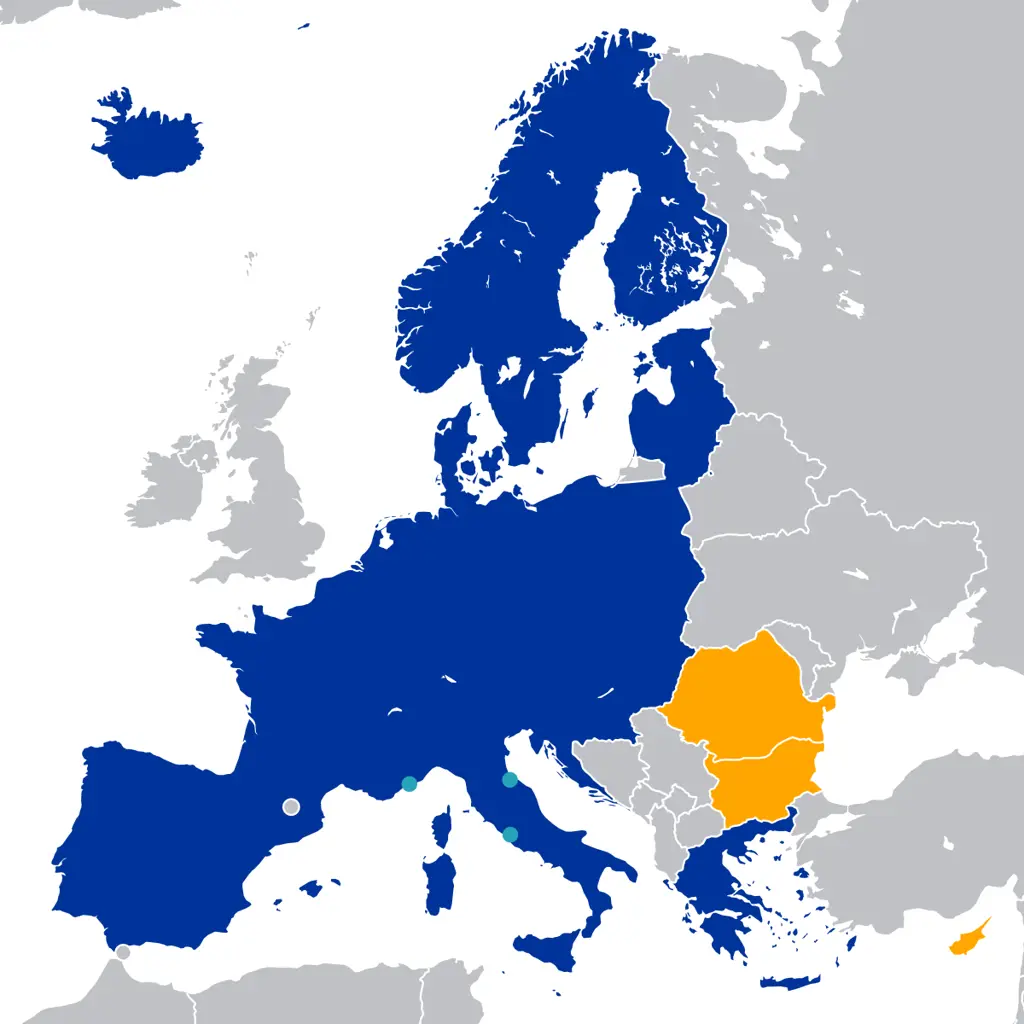
Switzerland, known for its breathtaking landscapes, charming cities, and rich cultural heritage, is a dream destination for many travelers. And with a Schengen Visa, exploring this captivating country has never been easier. Whether you're planning a ski trip in the Swiss Alps or want to indulge in the famous Swiss chocolate and cheese, traveling to Switzerland with a Schengen Visa opens up a world of possibilities. However, before you embark on your Swiss adventure, there are a few things you need to know. From visa requirements to must-visit attractions, this guide will help you make the most of your trip to Switzerland. So pack your bags, and get ready to explore the beauty and elegance of Switzerland!
What You'll Learn
- What is a Schengen visa and how does it relate to traveling to Switzerland?
- Can someone with a valid Schengen visa travel to Switzerland without any additional requirements?
- Are there any specific conditions or limitations for traveling to Switzerland with a Schengen visa?
- Can someone on a Schengen visa visit other countries besides Switzerland during their stay?
- What should someone with a Schengen visa know about their rights and responsibilities when traveling to Switzerland?

What is a Schengen visa and how does it relate to traveling to Switzerland?

A Schengen visa is a type of visa that allows travelers to enter and travel freely within the Schengen Area, which is a group of 26 European countries that have abolished passport control at their common borders. This visa is required for citizens of certain countries who wish to travel to these countries for tourism, business, or other short-term purposes.
Switzerland is one of the countries in the Schengen Area, so if you are planning to travel to Switzerland for a short stay, you will need to obtain a Schengen visa. This visa allows you to enter Switzerland and travel throughout the Schengen Area for up to 90 days within a 180-day period.
The process of obtaining a Schengen visa for Switzerland can be divided into several steps. First, you will need to determine the type of visa you need. There are different types of Schengen visas, such as the tourist visa, business visa, or visa for family visits. You should choose the one that best corresponds to the purpose of your trip.
After determining the type of visa, you will need to gather the necessary documents for your application. These documents typically include a completed visa application form, a valid passport, recent passport-sized photos, travel insurance, proof of accommodation in Switzerland, proof of financial means to support yourself during your stay, and a travel itinerary.
Once you have gathered all the required documents, you will need to schedule an appointment at the Swiss embassy or consulate in your country of residence. During the appointment, you will need to submit your application and pay the visa fee. You may also be required to provide biometric data, such as fingerprints.
After submitting your application, the embassy or consulate will process your visa. This process typically takes a few weeks, so it is important to apply well in advance of your planned trip. If your visa is approved, it will be affixed to your passport, and you will be able to travel to Switzerland and other Schengen countries.
It is important to note that a Schengen visa is valid for multiple entries into the Schengen Area. This means that once you have obtained the visa, you can travel in and out of Switzerland and other Schengen countries within the 90-day limit, as long as your total stay does not exceed 90 days within a 180-day period.
In conclusion, a Schengen visa is a necessary requirement for traveling to Switzerland and other countries in the Schengen Area. The process of obtaining a Schengen visa for Switzerland involves determining the type of visa, gathering the necessary documents, scheduling an appointment, and submitting the application. Once approved, the visa allows you to travel freely within the Schengen Area for up to 90 days within a 180-day period.
Can I Travel With a Valid Visa Using My Old Name?
You may want to see also

Can someone with a valid Schengen visa travel to Switzerland without any additional requirements?

If you hold a valid Schengen visa, you may be wondering whether you can travel to Switzerland without any additional requirements. The answer to this question depends on the type of Schengen visa you have and your intended purpose of travel.
Switzerland is part of the Schengen Area, which allows for visa-free travel between member countries. However, it is important to note that Switzerland is not a member of the European Union. As a result, some additional requirements may apply when traveling to Switzerland with a Schengen visa.
The type of Schengen visa you hold will determine whether you can travel to Switzerland without any additional requirements. There are three main types of Schengen visas:
- Uniform Schengen Visa (USV): This type of visa is issued for short-term stays and allows you to travel freely within the Schengen Area. If you hold a USV, you can travel to Switzerland without any additional requirements as long as your stay in Switzerland does not exceed 90 days within a 180-day period.
- Limited Territorial Validity Visa (LTV): This type of visa restricts travel to the territory of certain Schengen countries only. If you hold an LTV, you will not be able to travel to Switzerland without obtaining a separate visa or authorization specifically for Switzerland. You may need to contact the Swiss embassy or consulate in your country of residence for more information.
- National Visa (NV): This type of visa is issued for long-term stays and allows you to reside and work in a specific Schengen country. If you hold an NV issued by Switzerland, you can travel to Switzerland without any additional requirements.
It is important to note that even if you hold a valid Schengen visa, Swiss authorities may still ask for additional documentation or information when entering Switzerland. This could include proof of sufficient funds, travel insurance, accommodation bookings, and a return ticket.
In addition, the purpose of your travel may also affect whether you need any additional requirements. For example, if you are traveling for business or to study in Switzerland, you may need to provide additional documentation, such as an invitation letter from a company or educational institution in Switzerland.
In summary, if you hold a valid Uniform Schengen Visa or a National Visa issued by Switzerland, you can generally travel to Switzerland without any additional requirements. However, it is important to familiarize yourself with the specific requirements of your visa and the purpose of your travel to ensure a smooth entry into Switzerland.
Exploring the Nuances of Renewing a Travel Visa: What You Need to Know
You may want to see also

Are there any specific conditions or limitations for traveling to Switzerland with a Schengen visa?

If you are planning to travel to Switzerland with a Schengen visa, there are certain conditions and limitations that you need to be aware of. The Schengen visa is a common visa that allows you to travel freely within the Schengen Area, which includes Switzerland.
Firstly, it is important to note that the Schengen visa is valid for a maximum duration of 90 days within a period of 180 days. This means that you cannot stay in Switzerland for more than 90 days within a period of 180 days. It is essential to plan your trip accordingly and make sure that you do not exceed this limit.
Additionally, the purpose of your visit to Switzerland should align with the purpose specified in your visa application. For example, if you stated that you are visiting for tourism purposes, you should only engage in tourist activities during your stay. Engaging in any other activities, such as work or studying, can be a violation of the visa conditions.
Furthermore, it is important to have valid travel insurance that covers the entire duration of your stay in Switzerland. The insurance should have a minimum coverage of 30,000 Euros and should include medical expenses, repatriation, and emergency hospital treatment. It is recommended to carry a copy of your insurance policy with you at all times.
In terms of entry requirements, you should have a valid passport that is not older than 10 years and has a minimum validity of 3 months beyond your intended departure date from Switzerland. You may also be required to provide additional supporting documents, such as proof of accommodation, travel itinerary, and proof of sufficient funds to cover your expenses during your stay.
During your travel to Switzerland, it is important to comply with the local laws and regulations. It is advisable to familiarize yourself with the local customs and traditions to ensure a smooth and respectful experience. It is also recommended to carry your passport and visa documents with you at all times, as you may be required to present them to authorities upon request.
In conclusion, while traveling to Switzerland with a Schengen visa, it is important to adhere to the conditions and limitations imposed by the visa. Ensure that you do not exceed the maximum duration of stay, comply with the purpose of your visit, have valid travel insurance, meet the entry requirements, and follow the local laws and regulations. By doing so, you can have a enjoyable and hassle-free trip to Switzerland.
Exploring the Visa Exemption for Mexican Travelers to Japan: Requirements and Restrictions
You may want to see also

Can someone on a Schengen visa visit other countries besides Switzerland during their stay?

The Schengen visa is a document that allows its holder to travel freely within the Schengen Area, which includes 26 European countries. These countries have abolished passport control at their mutual borders, allowing for seamless travel. Switzerland is one of these countries, and many travelers who have obtained a Schengen visa may be curious if they can visit other countries during their stay.
The short answer is yes, someone on a Schengen visa can indeed visit other countries besides Switzerland during their stay. The Schengen visa allows for unrestricted travel within the entire Schengen Area. This means that travelers can visit any of the 26 countries that are part of the Schengen Area, including popular destinations like France, Italy, Spain, and Germany, among others.
To visit other countries during their Schengen visa stay, travelers simply need to ensure that they adhere to the maximum stay duration allowed by the visa. The Schengen visa typically allows for a maximum stay of 90 days within a 180-day period. This means that during the 180-day period following the date of first entry into the Schengen Area, the traveler can spend a maximum of 90 days in total across all Schengen countries.
For example, if someone enters Switzerland on their Schengen visa and stays for 60 days, they can then travel to another Schengen country, such as Italy, and stay for an additional 30 days. However, after this, they would have reached the maximum stay duration of 90 days within the 180-day period and would need to leave the Schengen Area.
It is important for travelers to keep track of their time spent in the Schengen Area and ensure they do not exceed the maximum stay duration. Overstaying the allowed time can result in penalties, fines, and future visa restrictions.
In addition to adhering to the maximum stay duration, travelers on a Schengen visa should also ensure they have the necessary documentation to enter other Schengen countries. While there are no internal border controls within the Schengen Area, travelers may still be required to present their passport or other forms of identification when crossing into another country.
It's worth noting that not all European countries are part of the Schengen Area. The United Kingdom, Ireland, and several other countries have opted out of the Schengen Agreement and maintain their own border controls. Travelers with a Schengen visa would need to check the specific visa requirements for these countries if they wish to visit them during their stay.
In conclusion, someone on a Schengen visa can visit other countries besides Switzerland during their stay. The Schengen visa allows for unrestricted travel within the 26 countries that make up the Schengen Area. Travelers should ensure they adhere to the maximum stay duration allowed by the visa and have the necessary documentation to enter other Schengen countries. It's important to keep track of time spent in the Schengen Area and be aware of which countries are part of the Schengen Agreement. With proper planning and adherence to the visa regulations, travelers can enjoy exploring multiple countries during their Schengen visa stay.
Is It Possible to Travel Through London with an Expired US Visa?
You may want to see also

What should someone with a Schengen visa know about their rights and responsibilities when traveling to Switzerland?

Traveling to Switzerland can be an exciting and rewarding experience for individuals with a Schengen visa. However, it's important to understand your rights and responsibilities when entering the country. This article will provide a comprehensive guide on what you should know when traveling to Switzerland with a Schengen visa.
First and foremost, it is essential to understand the scope of the Schengen visa. The Schengen visa is a short-stay visa that allows travelers to visit any of the 26 Schengen countries, including Switzerland, for a maximum of 90 days within a 180-day period. This means that you can travel freely within the Schengen area without the need for additional visas or border checks.
When entering Switzerland, you will be required to present several documents to the immigration authorities. These include a valid passport that is valid for at least three months beyond the intended period of stay, a completed and signed Schengen visa application form, proof of travel insurance coverage, proof of accommodation, and proof of financial means to support yourself during your stay.
It's important to note that while Switzerland is a member of the Schengen area, it is not a member of the European Union. Therefore, there are specific rules and regulations that apply to individuals traveling to Switzerland with a Schengen visa. For instance, if you plan to work or study in Switzerland, you may need to apply for a separate work or student visa.
Once you've entered Switzerland with a Schengen visa, you will have certain rights and responsibilities. As a visitor, you have the right to move freely within the Schengen area and travel to any of the other member countries. You also have the right to stay in Switzerland for up to 90 days within a 180-day period.
However, it's important to remember that the Schengen visa is a short-stay visa, and you are not allowed to work or engage in any paid activities during your stay. If you plan to work or engage in any business activities in Switzerland, you will need to apply for a separate work visa.
It's also important to respect and abide by the laws and regulations of Switzerland during your stay. This includes obeying traffic rules, following local customs and traditions, and respecting the environment. Switzerland is known for its strict laws, particularly regarding drug use, littering, and environmental protection.
In the event of an emergency, it's crucial to know your rights and responsibilities. If you require medical assistance, you have the right to access the Swiss healthcare system. However, it's important to note that healthcare in Switzerland can be expensive, so it's recommended to have comprehensive travel insurance that covers medical expenses.
In conclusion, traveling to Switzerland with a Schengen visa can be a fantastic experience. However, it's essential to be aware of your rights and responsibilities. Ensure that you have all the necessary documents, understand the limitations of a Schengen visa, and respect the laws and customs of Switzerland. By doing so, you can have a memorable and enjoyable stay in this beautiful European country.
Exploring the Possibility of Traveling to the US with a Canadian Visitor Visa
You may want to see also
Frequently asked questions
Yes, you can use a Schengen visa to travel to Switzerland. Switzerland is a part of the Schengen Area, which allows for visa-free travel between its member countries. If you have a valid Schengen visa, you can enter Switzerland and travel freely within the country.
No, you do not need a separate visa to visit Switzerland if you already have a Schengen visa. The Schengen visa allows for travel within all Schengen member countries, including Switzerland. As long as your Schengen visa is still valid and has multiple entries, you can use it to enter Switzerland without needing another visa.
With a Schengen visa, you can stay in Switzerland for a maximum of 90 days within a 180-day period. This rule applies to all Schengen member countries. If you plan to stay in Switzerland for longer than 90 days, you may need to apply for a long-stay visa or a residence permit.
No, you cannot work in Switzerland with a Schengen visa. The Schengen visa is a short-stay visa that allows for tourism, business, or visiting family and friends. If you plan to work in Switzerland, you will need to apply for a separate work visa or a residency permit that allows for employment.
Yes, you can travel to other Schengen countries from Switzerland with a Schengen visa. The Schengen visa allows for visa-free travel within all member countries. You can freely travel between Switzerland and other Schengen countries, as long as your Schengen visa is still valid and has multiple entries.







